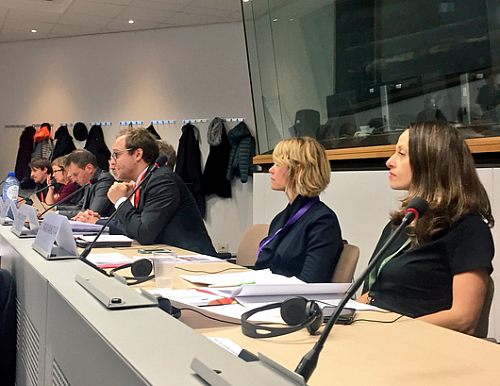BETTER GOVERNANCE FOR RESILIENT CITIES AND REGIONS – STARTING A DIALOGUE
Institutional capacities for well-functioning public administration is a fundamental aspect of development. This not only holds true for EU Enlargement Policy and its “fundamentals first approach”, but is also a crucial factor for EU Cohesion Policy. Thus, strengthening institutional capacities is an issue addressed by the European Structural and Investment Funds as well as the Instrument for Pre-Accession Assistance (IPA) and the European Neighbourhood Instrument (ENI). Stable and capable public administrations are a pre-condition for sustainable regional development inside and outside of the European Union. However, although funding instruments have been established in order to support good governance and well-functioning public administrations, there often is a lack of coordination and strategic planning among the projects in the different programmes. This reduces the benefits of capitalisation, the uptake, spreading and adaptation of successful project concepts and may slow down institutional development with special regards to South East Europe and the Danube Region.
BETTER GOVERNANCE FOR RESILIENT CITIES AND REGIONS AT THE EUROPEAN WEEK
Against this background, the Interact programme organised – with support from Priority Area 10 “Institutional Capacity and Cooperation” – the Workshop on “Better governance for more resilient cities and regions” in the framework of this year’s European Week of Regions and Cities in Brussels on 10 October 2017. The workshop aimed at paving the way for setting up a network of ESIF programmes and stakeholders from macro-regional strategies on improving governance. Representatives from ESIF programmes supporting institutional capacity building (Thematic Objective 11), macro-regional strategies as well as cities and regions gathered in order to discuss how to increase the administrative capacities in regions and cities and how to better use the interfaces between European Social Fund, macro-regional strategies and Interreg programmes.
The workshop connected territorial cohesion and multi-level governance with the need for increased institutional capacity. Thereby, the discussion addressed the issue of administrative capacity building, better spending of EU funds as well as transnational, interregional and macro-regional forms of cooperation for institutional learning including EU enlargement & neighbourhood policy.
COORDINATING THE SUPPORT FOR ADMINISTRATIVE CAPACITIES
High-level speakers Laura Indriliunaite and Florian Hauser (European Commission), Irena Parvanova(ESF Bulgaria), Rudolf Schicker (EUSDR Priority Area Coordinaton – City of Vienna), Johannes Gabriel(Danube Transnational Programme) shed some light on how to use EU funds and tools supporting administrative capacity building at national, regional, and municipal level and how transnational and interregional exchange of experience foster administrative capacity development.
The discussion was illustrated by project examples such as AgriGo4Cities and YOUMIG.
The workshop was considered to be a kick-off for a EU programme network for institutional capacity building esatblished by Interact and supported by Priority Area 10 “Institutional Capacity and Cooperation” from the EU Strategy for the Danube Region.
Priority Area 10 “Institutional Capacity and Cooperation” planned to engage in meetings organised in cooperation with INTERACT and further representatives from the macro-regional strategies responsible for institutional capacity building and ESIF/IPA Managing Authorities funding institutional capacity. The meetings shall facilitate the regular exchange on information and needs of the stakeholders from the macro-regional strategies and Managing Authorities in terms of project application and implementation that contribute to the targets of the strategies as well as to the performance framework of the Operational Programmes/Cooperation Programmes of the European Structural and Investment Funds that support institutional capacity building.
Photo Credit: Interact




